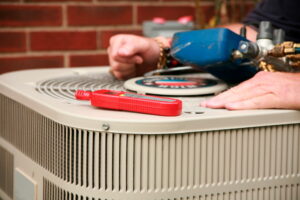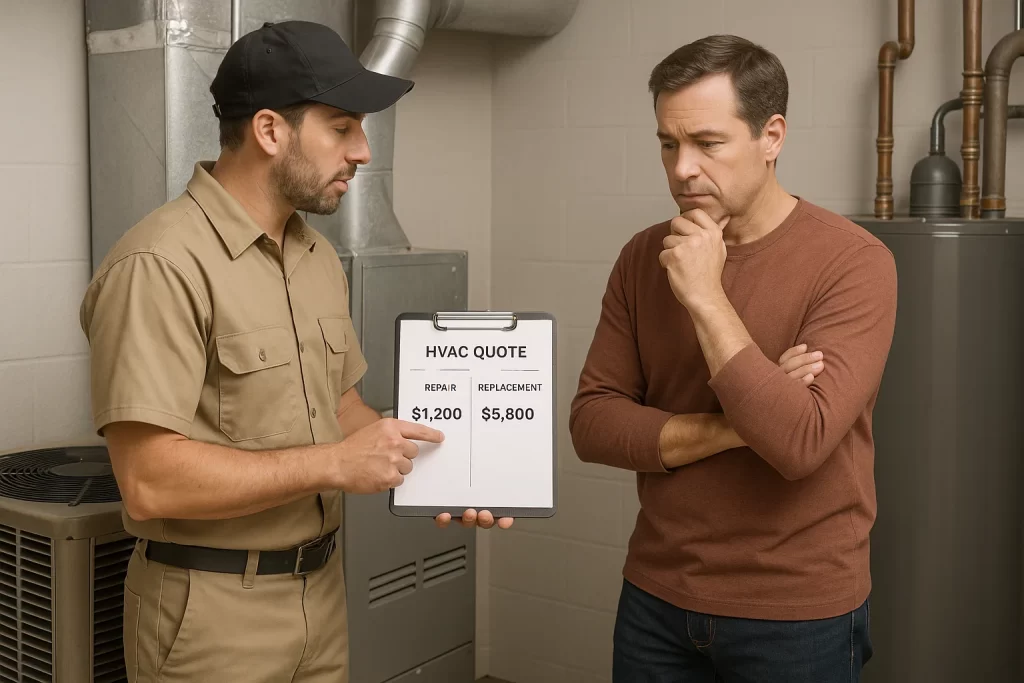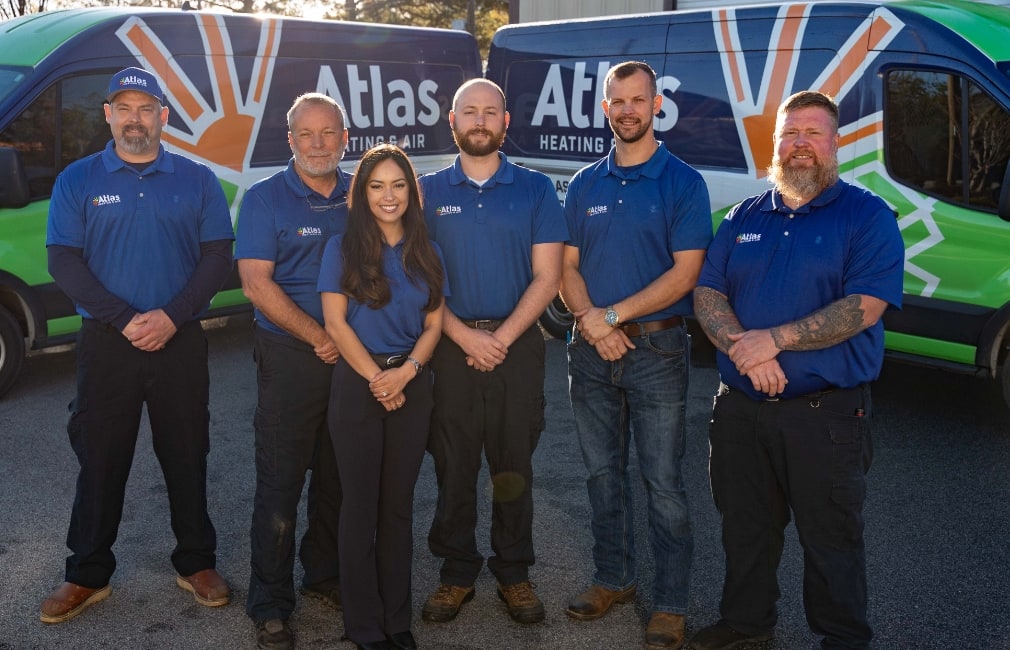
When your HVAC system starts acting, blowing warm air, running nonstop, or causing inconsistent temperatures throughout your home, it’s natural to wonder: Should I repair or replace it? Cool air blowing from the vents can also suggest a problem with the heater. This is one of the most common questions homeowners face, especially during peak heating or cooling seasons.
While repairs may seem like the cheaper route upfront, there are times when investing in a replacement offers greater long-term value, improved comfort, and energy efficiency. If you’re considering an upgrade, exploring your air conditioning installation options can help you understand the features and benefits of modern systems built for higher efficiency and reliability. Here’s a detailed guide to help you weigh the most important factors when deciding between repairing your existing system or upgrading to a new one. A professional assessment is crucial to determine the health, compatibility, and remaining lifespan of your HVAC system before making a decision. Be sure to assess the age and condition of your ac unit and heating system, as this will help you make an informed choice about repair or replacement.

Introduction to HVAC Decision Making
When it comes to making decisions about your home’s comfort, one of the biggest choices is whether to replace both your furnace and air conditioner at the same time. Upgrading both your furnace and air conditioner together can offer significant advantages, especially as new HVAC systems are designed for better efficiency and seamless integration. By replacing both systems, you can enjoy improved performance, lower energy costs, and enhanced comfort throughout your home. Additionally, replacing both your furnace and AC at the same time can save you between $2,000 and $5,000 on installation costs. Modern HVAC systems work together to deliver consistent air quality and temperature, making your investment more cost-effective in the long run. Replacing both units can also lead to fewer future repairs due to increased reliability from newer equipment. As you consider your options, it’s important to weigh the factors that impact efficiency, performance, and overall value, so you can make the best decision for your home and budget.
How do I decide whether to repair or replace my HVAC system?
- System age: Furnaces typically last 15–20 years, air conditioners and heat pumps 10–15 years
- Repair vs replacement cost: Replace if the repair bill is more than 50% of a new unit’s price
- Energy efficiency: New ENERGY STAR units can reduce energy use by 20–40%
- Comfort and air quality: Modern systems improve temperature consistency, humidity control, and filtration
Incentives and resale value: Tax credits, rebates, and higher home value can make replacement worthwhile
1. Age of the System
Age is one of the biggest indicators of whether it’s time to replace your HVAC system. Most heating and cooling units have a lifespan of:
- Furnaces: 15–20 years
- Central air conditioners and heat pumps: 10–15 years
- Ductless mini-splits: 10–20 years
If your system is more than 10 years old and requiring frequent or costly repairs, it may be time to consider a replacement. Even if the system is still functional, efficiency and performance typically decline with age.
2. Cost of Repairs
A good rule of thumb is the 50% Rule: If the cost of the repair is more than 50% of the cost of a new system, and your current unit is over 10 years old, replacement is usually the smarter financial decision.
You should also consider how often you’ve had to call for repairs recently. If breakdowns are becoming more frequent, those costs will continue to add up–and leave you without heating or cooling at the worst times. In these situations, scheduling expert air conditioning repair service can help assess whether repairs are still viable or if replacement makes more financial sense. Older HVAC systems typically experience more breakdowns and malfunctions, which can make frequent repairs both costly and inconvenient.
3. Energy Efficiency and Utility Savings
Older HVAC systems are often far less efficient than today’s ENERGY STAR®-certified models. Modern HVAC systems are usually more energy-efficient than older systems, making them a smart choice for both environmental and financial benefits. However, higher energy efficiency ratings often result in higher upfront installation costs, so it’s important to consider your budget and long-term savings when making a decision. Upgrading to a new high-efficiency unit can:
- Lower your monthly energy bills
- Improve indoor comfort with more consistent temperatures
- Reduce your carbon footprint
In fact, some homeowners experience up to 20–40% savings in energy costs simply by replacing outdated equipment with modern, efficient systems. Routine AC maintenance and tune-ups can also help extend system life and optimize performance while you weigh your replacement options. Plus, new systems often come with advanced features like variable-speed motors, smart thermostats, and better zoning capabilities.
4. Comfort and Air Quality
Do you notice hot and cold spots in your home, or is the air feeling stuffy and stale? These comfort issues often point to an HVAC system that can no longer meet your household’s demands. A significant buildup of dry and dusty air can also suggest HVAC issues. A new system can dramatically improve:
- Temperature consistency
- Humidity control
- Filtration and indoor air quality
- Noise levels during operation
Additionally, HVAC accessories such as smart thermostats, air purifiers, and humidifiers can further enhance comfort and indoor air quality when upgrading your system.
If better indoor comfort is a priority, a system upgrade could be well worth the investment.
5. Availability of Incentives and Financing
Now may be one of the best times to replace your HVAC system, thanks to available tax credits and rebates. When you install an energy-efficient system, you could qualify for:
- Up to $2,000 in federal tax credits through the Inflation Reduction Act
- Local utility rebates depending on your area
- Manufacturer promotions and discounts
Homeowners can access these rebates and incentive programs to make energy-efficient upgrades more affordable.
Plus, with payments as low as $150/month, replacing your HVAC system can be more affordable than ever. We also offer free estimates so you can explore your options with zero pressure.
6. Future Home Plans
If you’re planning to stay in your home for many more years, investing in a new system ensures reliable comfort and efficiency. However, if you’re planning to move soon, a repair may suffice, but keep in mind, a newer HVAC system can be a big selling point for buyers and help boost your home’s resale value. A modern HVAC system can also improve comfort and efficiency throughout the entire house.
System Compatibility and Integration
Ensuring system compatibility is essential when replacing your furnace and air conditioner. Most homes use split HVAC systems, where the air conditioner and furnace work together to provide both heating and cooling. The air conditioner’s outdoor unit removes hot air and delivers cool air inside, while the furnace heats air during colder months and circulates it throughout your home. For optimal performance and energy efficiency, it’s important that your new furnace and air conditioner are compatible and designed to work as a cohesive system. Installing a new furnace with an older air conditioner, or vice versa, can lead to reduced efficiency, uneven temperatures, and even premature equipment wear. The quality of the installation company also affects the long-term performance of HVAC systems. By choosing compatible units and a trusted installer, you ensure your HVAC system delivers reliable comfort, better efficiency, and long-term savings.
Geographic and Environmental Factors
Where you live plays a major role in determining the right HVAC system for your home. In hot and humid climates like Augusta, Georgia, your air conditioner needs to be powerful and efficient enough to maintain a comfortable temperature even during the hottest days. Conversely, homes in colder regions require a furnace that can deliver efficient heating throughout the winter. Other environmental factors, such as your home’s insulation, window quality, and ductwork, also impact the performance and efficiency of your HVAC system. By understanding these factors, you can select a system that’s tailored to your local climate and home’s unique needs, ensuring you maintain comfort while keeping energy costs in check.
Ductwork and Ventilation Considerations
When replacing both your furnace and air conditioner, it’s important not to overlook the role of your home’s ductwork and ventilation system. Even the most advanced HVAC systems can’t deliver optimal performance or energy efficiency if the supporting ductwork is outdated, leaky, or improperly sized. Issues like air leaks, poor insulation, or damaged ducts can lead to significant energy losses, uneven temperatures, and higher repair costs over time. Before installing a new furnace or air conditioner, an HVAC professional should thoroughly assess your ductwork to identify any areas that need repair or modification. This assessment ensures that your new HVAC systems can operate efficiently, providing consistent air distribution and helping to keep your energy bills in check. By addressing ductwork and ventilation during the replacement process, you’ll facilitate a seamless integration of your new system and enjoy improved comfort and efficiency throughout your home.
Choosing the Right Equipment
Selecting the right equipment is a crucial step when replacing both your furnace and air conditioner. The right combination of new HVAC systems can deliver better efficiency, enhanced performance, and significant energy savings for your home. When evaluating options, look for air conditioners and furnaces with high energy efficiency ratings, such as SEER2 for cooling and AFUE for heating. It’s also important to consider the size of your home, insulation quality, and local climate to determine the appropriate system capacity. An experienced HVAC professional can help you compare different models and brands, ensuring you choose equipment that is compatible and tailored to your specific needs and budget. By investing in the right system, you’ll not only improve comfort and air quality but also maximize your return on investment with lower energy bills and fewer future repairs. This careful selection process is especially valuable for homeowners in the local community who want reliable, long-term solutions for their heating and cooling needs.
Installation Considerations
Proper installation is key to getting the most out of your new furnace and air conditioner. A professional HVAC installation ensures that your system operates at peak performance and energy efficiency. Factors like ductwork design, insulation quality, and ventilation all play a role in how well your new system will perform. It’s important to work with a qualified HVAC professional who can assess your home, recommend the right system, and ensure a smooth installation process. Additionally, warranties on new HVAC systems provide protection for parts and labor, ensuring long-term investment security. Considering ongoing maintenance, energy efficiency ratings, and warranty coverage can help you protect your investment and avoid unexpected costs down the road. By focusing on these installation considerations, you can maximize comfort and efficiency while staying within your budget.
Warranty Coverage and Support
When investing in a new HVAC system, warranty coverage and ongoing support are key factors to consider. A strong warranty from reputable manufacturers can protect your investment by covering parts and labor for unexpected repairs, giving you peace of mind as you enjoy your new system. It’s wise to review the details of each warranty, including what is covered, the duration, and any conditions that may apply. Equally important is the support provided by the installing company—choose an HVAC professional known for reliable service and prompt response to maintenance or repair needs. This partnership ensures your system is properly maintained for optimal performance and longevity. By prioritizing comprehensive warranty coverage and dependable support services, you can safeguard your investment and enjoy the benefits of your new HVAC system for years to come.
Working with an HVAC Professional
Partnering with a qualified HVAC professional is essential when replacing both your furnace and air conditioner. An experienced technician can assess your home’s unique requirements, recommend the best equipment, and ensure a flawless installation that maximizes energy efficiency and system performance. Professional HVAC installations help prevent frequent breakdowns, reduce repair costs, and extend the lifespan of your new system. In addition to installation, a reputable HVAC professional will offer maintenance services to keep your equipment running smoothly and efficiently, helping you avoid unexpected issues and high energy bills. When choosing a technician, look for proper certifications, positive customer reviews, and a strong reputation in your local community—whether you’re in a large city like Augusta, Georgia, or a smaller town. By investing in expert guidance and ongoing maintenance, you’ll facilitate optimal performance, better efficiency, and lasting comfort for your home.
Decision-Making Process
Deciding whether to repair or replace your furnace and air conditioner involves several important steps. Start by evaluating the age and condition of your current system—if your air conditioner and furnace are nearing the end of their expected lifespan, replacing both may be the most cost-effective solution. Next, consider your energy efficiency goals and review your recent energy bills, maintenance expenses, and repair costs. Consulting with an experienced HVAC professional can help you assess your options and determine the best course of action for your home and budget. By carefully weighing these factors and seeking expert advice, you can make a confident decision that delivers reliable comfort, energy savings, and peace of mind for years to come.
Frequently Asked Questions
Question: What should I consider about my HVAC system’s age when deciding to repair or replace?
Answer: The age of your system is a key factor. Central air conditioners or heat pumps typically last 10–15 years, furnaces about 15–20 years, and ductless mini-splits 10–20 years. If your unit is over 10 years old and needing frequent or expensive repairs, replacement is often the smarter financial choice.
Question: How does repair cost influence the decision between fixing and replacing my system?
Answer: A practical guideline is the “50 % rule”: if a repair costs more than half the price of a new unit—especially if your system is over 10 years old—it’s usually more cost-effective to replace rather than repair.
Question: What role does energy efficiency play in choosing between repair and replacement?
Answer: Older HVAC systems are often far less efficient than modern ENERGY STAR® units. Upgrading can deliver significant savings—often 20–40 % on energy costs—while also improving comfort and reducing your carbon footprint.
Question: When might repairing be the better option over replacing my HVAC system?
Answer: Repair may be wise if your system is less than 10 years old, well-maintained, and the issue is minor—such as a faulty thermostat or capacitor. Also, if you’re planning to move soon, repairing can be a more economical short-term solution.Question: How does system comfort and reliability affect the repair vs replacement decision?
Answer: If your home experiences uneven cooling, temperature fluctuations, strange noises, or poor overall performance, even after repairs, a replacement could restore consistent comfort and reliable operation. Newer units also offer features like smart thermostats and better humidity control.
Call Atlas Heating & Air today to schedule your AC repair and discover why so many local homeowners count on us for fast, honest, and high-quality service.


